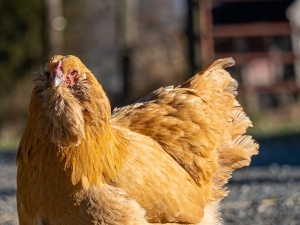
Chickens can suffer from a variety of illnesses, these illnesses can bring along a variety of different symptoms. If your sick bird’s head is twitching then this article will be of help to you.
Table of Contents
Sick chicken head twitching
The more symptoms an illness brings out in a chicken the easier the illness is to diagnose. A variety of chicken illnesses share the same symptoms.
If your sick chickens head is twitching then the bird may have gapeworm or an impacted crop
Gapeworm:
A bird twitching its head is a sign of irritation somewhere that the bird can’t reach. Head twitching is a sign of discomfort. A gapeworm infection can cause discomfort in the bird.
Gapeworms are thin red worms that make their way into a chicken’s body and attach themselves to the bird’s trachea. They can cause a bird to twitch its head and if not addressed, they can also cause the bird to suffocate.
The worms will attach themselves to the bird’s trachea, multiply, fill up and then block off the bird’s throat. This can cause the bird to have difficulty breathing and cause the bird to suffocate.
In addition to the twitching of the head the bird will also wheeze, cough, gape, gasp for breath, and pant if suffering from a gapeworm infestation.
What to do:
The first thing that you’d need to do if your bird has gapeworm is to isolate the bird. You can keep the bird isolated in a dog kennel or in a cat carrier
Treat the bird with a chicken dewormer to get rid of the worms.
You’d also need to treat the rest of the birds in the flock with a dewormer. The rest of the birds in the flock may have this ailment but may not show any signs of it.
Treating the birds twice is recommended. The first treatment will kill the worms that initially infected the birds, the second will kill the worms that your birds release in their poop and the worms that the birds cough up.
You can take precautions to prevent worm infections from infecting your flock in the future. Do this by creating a deworming plan for your birds. Deworming your birds twice a year is recommended.
Crop impaction:
Crop impaction is a condition that chickens, and other free-range birds, can develop. The crop of a chicken will enlarge with food as the bird eats but it should go down as the food passes down into the rest of the bird’s digestive system.
If a bird’s crop becomes blocked, then the bird is considered to have an impacted crop. An impacted crop will stay enlarged and hard, full of food, long after the bird has eaten.
A bird may develop an impacted crop after it eats long grasses. When these long grasses reach the bird’s crop they will bind with the chicken’s feed causing a blockage in the crop.
A bird that is suffering from crop impaction will jerk its head because it is trying to free up the contents of its crop. The bird may also seem preoccupied, it may make gaping movements with its mouth like it’s choking in an effort to clear out it’s crop.
What to do:
You can test to see if the bird does actually have an impacted crop. Do this by keeping the bird from food and water after dark and then checking to see if the bird’s crop has gone down by the morning.
If the bird’s crop does not go down, and the crop does not feel empty in the morning, then the bird has an impacted crop
The bird’s full crop may not be so obvious so you’d need to feel if the crop is hard or not both the night before and the next day. An impacted crop will feel hard in the evening and hard the next day.
You can treat the bird’s impacted crop at home. Keep your bird away from food for an extended period of time and then lubricate the bird’s throat with 10ml of warm vegetable oil trickled down the sides of the bird’s throat.
Massage the bird’s crop for 10 minutes after lubricating the bird’s throat.
You may need to repeat this every couple of hours.
If the bird’s impacted crop does not break up after this then you may need to take the bird to the vet, do not wait more than 24 hours to do this.
If necessary, the bird may need surgery to get the contents of the crop out. You should avoid trying to do the surgery yourself, rather let the vet do it.
FAQ:
Why is my chicken doing a weird head movement?
There are a variety of reasons why your chicken’s head may move oddly, these include wry neck, a head or neck injury, poor eyesight, or the bird may simply be trying to relieve pressure and irritation in their crop.
What signs to look for in a sick chicken?
There are a variety of signs that your sick chicken will display, some of these signs include a pale comb, sneezing, labored breathing, a loss of appetite, a pale-looking comb, diarrhea, lethargy, weight loss, limping, a change in feces, ruffled feathers, and a change in feather quality
If you enjoyed this article then you may also be interested in other chicken related articles. Here are some articles that you may be interested in: Chicken Is Spinning In Circles, Chicken Hanging Head Down, How To Tell If A Chicken Has Internal Bleeding, Lime Vs Diatomaceous Earth For Chickens, Chicken Preening Or Itching

